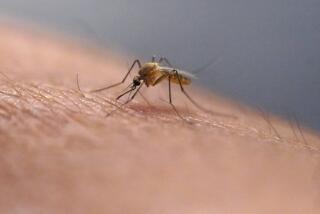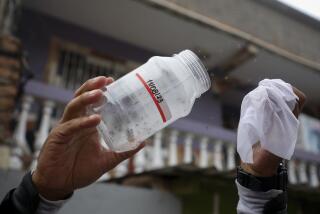Smoke clears on a Cuban epidemic
- Share via
HAVANA — An epidemic of dengue fever that flooded hospitals and may have killed as many as 100 Cubans has been brought under control by a fumigation campaign involving 300,000 students, pensioners and healthcare workers.
The outbreak of the mosquito-borne virus here was the worst in a quarter of a century and appears to have afflicted thousands during its peak in September and October. The infection rate has slowed to only a few dozen new cases this month, said a senior doctor familiar with the scope of the epidemic, who added that the response was initially slowed by government secrecy.
Caused by a mosquito-borne virus, dengue produces flu-like symptoms, including fever. It occurs in most tropical areas of the world and is widespread in the Caribbean basin.
The physician complained bitterly about the veil initially imposed by Communist Party officials. The ostensible purpose was to avoid panicking the public, but the demand that the epidemic be treated as a confidential security matter was strongest in early September, when preparations were underway for the 14th summit of the Non-Aligned Movement, to be held in Havana. That gathering of Third World leaders brought 3,000 foreign visitors from more than 100 countries to the capital Sept. 11-16, including about 50 heads of state and government.
The doctor spoke on condition of anonymity because of the possibility of dismissal from his job or arrest for discussing the matter with a reporter.
“We were forbidden even to refer to it as dengue fever, because the official position is that dengue was eradicated in the 1980s,” said the doctor, who has nearly three decades of experience in Havana hospitals. “We were compelled to call it ‘fever syndrome.’ ”
Cuba’s Public Health Ministry later confirmed the outbreak, telling the Pan American Health Organization representative in Havana on Oct. 13 that the country was suffering “a classic dengue outbreak” and that about 10% of the cases involved children.
The ministry gave no count of the afflicted and said that an unspecified number of deaths were “associated with preexisting chronic conditions.”
But dengue deaths here and in at least four other provinces have been reported to relatives abroad, providing anecdotal support for the doctor’s estimate of 100 deaths nationwide.
A Havana pediatrician, Angel Arturo Aballi, told a Web-based dissident news agency that more than 1,000 children were hospitalized with dengue fever in mid-September, when new admissions were coming at the rate of 50 a day.
The government report to the health organization also gave no details of the epidemic’s scope but asserted that Cuba “has the necessary resources, materials and trained staff to deal with this event, in addition to political will and integrated activities” of government agencies and the population.
“Cuba is the only country in the world that can control for considerable periods of time the insect-transmitter and its terrible effects,” Vice President Carlos Lage Davila, a physician thought to be No. 3 in the party hierarchy behind President Fidel Castro and his brother Raul, said in late October in a televised discussion of the “fever syndrome.”
The first cases came to doctors’ attention in July, and by September the numbers had exploded. Hospitals discharged other patients and canceled surgeries to accommodate the dengue sufferers, the doctor said.
Exacerbating the situation, he said, were renovation projects that have made as many as 70% of the capital’s hospital beds unavailable for the last few years.
Havana residents report that a public education campaign to combat mosquito breeding got underway in earnest after the summit, when the government marshaled all available healthcare resources to deploy “Brigades in the Battle Against Aedes Aegypti,” the day-biting mosquito that carries dengue.
Squads of khaki-clad troops in the “Army of Youth Workers” from Havana universities and Communist Party federations comb the capital street by street, training their portable insecticide bazookas along curbs, building foundations, fences and potholes. Tanker trucks blast the narrow streets of densely populated areas such as Old Havana, sending up acrid clouds between the buildings where glassless windows are protected only by wooden slats.
“The crisis has been lessening in recent days,” a young veterinarian said as he cast his flashlight over the water in rooftop cisterns at an apartment building in the Vedado neighborhood. He inquired at each household whether anyone had been ill with rash, headache, fever or joint and muscle aches. He checked the bathrooms and balconies for standing water, then signed and dated the inspection records taped to each apartment door.
Asked how many cases of dengue fever had been fatal, the veterinarian lifted his hands in a defensive gesture. “We don’t know about deaths,” he said. “That may be considered strategic information.”
Maria del Carmen Marquetti, a specialist at the Pedro Kouri Institute of Tropical Medicine, reminded Cubans who keep a glass of water on a shelf or counter as an offering to Afro-Cuban deities that it should be changed frequently to prevent mosquito larvae from forming.
Residents found to have open water sources with mosquito larvae can be fined for failing to do their part in combating the epidemic, Havana residents said. Despite official efforts to keep the name of the disease out of public discourse, most know about it from friends and neighbors who have been sick.
“People here are skilled at reading between the lines. They know what goes on, even if the authorities won’t tell them,” said an intellectual whose wife weathered the fever.
Cuba suffered its last major outbreak of dengue in 1981, when 158 died, two-thirds of the victims children. A concerted spraying effort ended the epidemic, and advances in healthcare and sanitation had enabled the country to stay relatively free of the virus, which kills 20,000 worldwide every year.
This year’s epidemic and an accelerating decline in public sanitation have doctors worried about recurrence once the current campaign subsides.
“There are now fears that it is endemic in Cuba too,” the senior doctor said. “It will recur after the cool winter months, when everyone again lets his guard down.”
More to Read
Sign up for Essential California
The most important California stories and recommendations in your inbox every morning.
You may occasionally receive promotional content from the Los Angeles Times.










